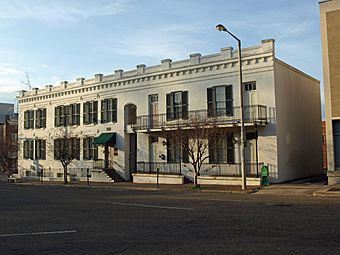William Lowndes Yancey Law Office facts for kids
|
William Lowndes Yancey Law Office
|
|

William Lowndes Yancey Law Office in 2009
|
|
| Location | Montgomery, Alabama |
|---|---|
| Built | 1846 |
| NRHP reference No. | 73000371 |
Quick facts for kids Significant dates |
|
| Added to NRHP | November 7, 1973 |
| Delisted NHL | 1986 |
The William Lowndes Yancey Law Office is an important historical building in Montgomery, Alabama. It was once the law office of William Lowndes Yancey, a famous lawyer and politician. He worked here from 1846 until his death in 1863.
Yancey was a key figure in the South before the Civil War. He strongly believed that Southern states should have the right to make their own laws, especially about slavery. He was a leading voice for states leaving the United States.
History of the Law Office
This building, located at Washington and Perry Streets, became Yancey's law office in 1846. He had just left the United States Congress. He partnered with another lawyer, John A. Elmore, to form a law firm.
Yancey's Role in History
William Lowndes Yancey was a powerful speaker and political leader. He was known as a "Fire-Eater," a term for Southern politicians who strongly pushed for states to leave the Union. He believed states should have more power than the federal government.
He played a big part in the disagreements between the North and South. These disagreements eventually led to the Civil War. After Abraham Lincoln was elected president, Yancey wrote Alabama's official document for leaving the United States. This was called the Ordinance of Secession. Later, he served as a representative for the Confederate States of America in England and France.
Historic Recognition and Changes
The William Lowndes Yancey Law Office was recognized as a very important historical site. In 1973, it was added to the National Register of Historic Places. This list includes buildings, sites, and objects important in American history.
On the same day, November 7, 1973, it was also named a National Historic Landmark. This is an even higher honor for places that show important parts of American history. At that time, the inside of the building still looked much like it did historically.
However, in the late 1970s, the building was changed a lot during a redevelopment project. Many of its original historical features were lost. Because of these changes, it no longer met the strict rules for a National Historic Landmark. So, on March 5, 1986, its landmark status was removed. Even so, the building is still on the National Register of Historic Places.
 | Janet Taylor Pickett |
 | Synthia Saint James |
 | Howardena Pindell |
 | Faith Ringgold |



